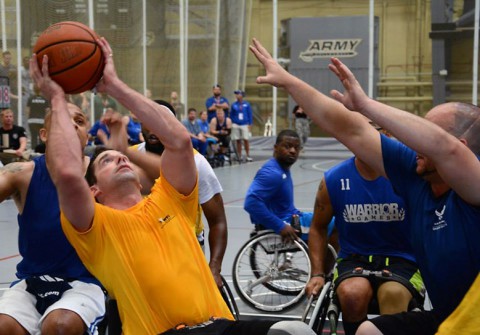 Alexandria, VA – The 2015 Army Trials will be at Fort Bliss, Texas, in El Paso, March 29th – April 2nd, and is the second run of this event. The 2015 Department of Defense (DoD) competition is slated for this summer.
Alexandria, VA – The 2015 Army Trials will be at Fort Bliss, Texas, in El Paso, March 29th – April 2nd, and is the second run of this event. The 2015 Department of Defense (DoD) competition is slated for this summer.
In 2014 more than 100 wounded, ill and injured service members and Veterans from across the United States traveled to the U.S. Military Academy, West Point, NY, to train and compete for the first time in a series of competitive athletic events known as the Army Trials*. The Army Trials help determine which Army athletes compete on the DoD competition Army Team.

Army Trials showcase the resilient spirit of wounded, ill and injured Soldiers and Veterans. Participants in Army Trials include athletes with spinal cord injuries, traumatic brain injuries, visual impairments, serious illnesses and amputations.
Athletes begin the path to the Army Trials in unit level competitions and proceed to Army Regional Trials. Athletes advance from Regional Trials to the Army Trials. They work with expert coaches, sports trainers, and nutritionists to prepare for competitions.
This rigorous Adaptive Reconditioning training enhances the recovery process of individual Soldiers, regardless if they ultimately qualify for the Army DoD competition team.
Athletes possessing the professionalism, team spirit, and the best qualification times and/or scores, are selected to compete in the DoD competition.
In Warrior Transition Units (WTU) medical professionals and Adaptive Reconditioning Coordinators work with recovering Soldiers to include adaptive activities and sports as part of individualized Comprehensive Transition Plans (CTP).
The term Adaptive Reconditioning encompasses all activities and sports that contribute to the optimization of physical, cognitive and emotional well-being.
These activities – competitive sports, outdoor activities and arts and cultural programs, support personalized goals across six domains: physical, career, social, spiritual, emotional, and family. Adaptive Reconditioning Program activities contribute to the development different skills.
The Army’s Adaptive Reconditioning Program provides prospective athletes with training plans, enhanced skills and intermittent evaluations. The program insures that the activities Soldiers participate in contribute to the Soldier returning to the force or to a successful transition as a Veteran.
Warrior Transition Command (WTC) Adaptive Reconditioning Division Online: http://www.WTC.army.mil/Soldier/adaptive.html
*In 2014 the event was called “The U.S. Army Warrior Trials”
To Compete
Army Trials are open to Soldiers in WTUs, Soldiers who were in WTUs and returned to active duty, and WTU Soldiers who transitioned to Veteran status.
For information about competing contact the WTC Adaptive Reconditioning Office: usarmy.pentagon.medcom-wtc.list.adaptive-sport-branch@mail.mil
Benefits of Participating in Adaptive Reconditioning Program Activities and Sports
- Decreased stress
- Increased self-confidence
- Reduced dependency on pain and depression medications
- Increased mobility
- May reduce secondary medical conditions such as diabetes, obesity, or hypertension as a result of physical activity
- Increased lean muscle mass
- Decreased body weight and fat
- Higher achievement in education and employment
- Relationships with other Soldiers and service members
- New life skills that contribute to successful transitions


